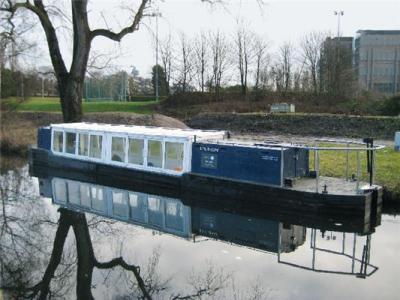The University of Birmingham has been testing a hydrogen powered prototype canal boat for inland waterways for around three years. Empa has designed the hydrogen tank for this boat. While the weight of the propulsion system has little significance on a boat, its lifetime must be equal to the lifetime of the boat.
 The converted hydrogen-fuelled barge "Ross Barlow" with the Empa-developed hydride storage tank
The converted hydrogen-fuelled barge "Ross Barlow" with the Empa-developed hydride storage tank
The university removed the drive system, fuel tank and diesel motor from an old barge, and replaced them with a battery pack, a fuel cell having a hydrogen storage system, and an efficient electric motor. The converted "Ross Barlow" was launched on Britain's canal system in September 2007. In 2010, the barge made a 105 km, four day journey negotiating around 58 locks. The barge and its travelers consumed 106 kWh of electric energy during the voyage. The hydrogen fuel cell provided 25% of the energy; the batteries provided 71%, while a solar panel supplied 4%. An accompanying boat consumed around 50 L of diesel, which leads to CO2 emissions of around 133 kg. The barge did not produce any CO2.
The "Ross Barlow" was fitted with a 10 kW permanent magnet motor, a 1 kW commercial fuel cell and a 47 kWh buffer battery. The university used low maintenance and cost-effective lead acid batteries that were also easily chargeable. The buffer battery was added as the fuel cell capacity was insufficient to directly power the boat.
The Empa developed hydride storage system can store hydrogen having 50 kWh energy content. Zirconium, titanium, iron, vanadium and manganese alloy in powder form is packed inside steel tubes. The powder stores hydrogen and releases it when heated.
If the "Ross Barlow" had to travel 650 km in a year, then its metal hydride storage system would require refueling once in a month. This would translate to an operating lifetime of over 100 years, which would be more than the barge’s lifetime.